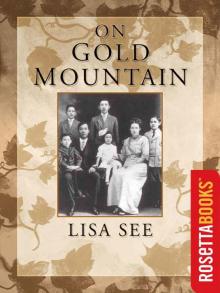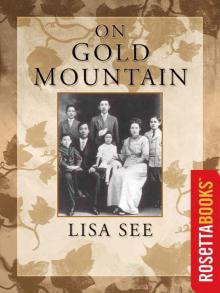The Interior Read online
Page 20
Feeling sorry for Siang, Hulan reached across the table and patted her hand. “You don’t have to do what he says.”
Siang looked up not in embarrassment but in defiance. “Why wouldn’t I go?”
“Isn’t it obvious that he does this with other girls?”
“So what?”
“So you could get hurt. You could get a disease. You could—”
“You only say those things because you’re old.” Siang filled the last word with as much contempt as she could marshal. As Hulan recoiled at the insult, Siang went on. “Don’t look so surprised. It’s true you look young, almost like one of us. But you are a friend of Ling Suchee. Tsai Bing’s mother says you are girlhood friends. Well, if you are friends for that many years, then you are as old as that old woman.”
Peanut consumed all this with considerable interest, and Hulan had no doubts that their conversation would be common knowledge by lights out tonight.
“And what about Tsai Bing?” Hulan asked.
“He’s the reason I’ll do it.” Siang pushed her tray away and stood. “We want to be together, but how can we without money?”
Hulan and Peanut watched Siang wend her way through the tables. “True-heart love, eh?” Peanut asked. Hulan nodded. “Parental objection too?” When Hulan nodded again, Peanut sighed at the hopelessness of it all.
During the long, hot afternoon, as Hulan continued to jab hair through tiny holes in the Sam dolls, Peanut peppered them both with questions: What villages were they from? How had they been hired? What were they saving money for? Fortunately, Hulan didn’t have to worry too much about her answers due to Siang’s repeated interruptions. Eventually Peanut directed her questions solely to Siang, who responded with an insolent brashness, as though she were taunting them with her family’s superiority.
“A hundred years ago my family was important in this area,” Siang said. “They were landowners, the worst of the worst, but even so, they didn’t have so much. They weren’t Mandarins or educated, but they’d been in this district for many centuries. They were slave owners. They bought girls to work in the house and eventually become the concubines of my great-great-uncles.”
All of these words were spoken with perfunctory contrition, for there was no masking Siang’s pride in her family’s past. Still, to be on the safe side, she covered her haughtiness by adding, “I had a great-uncle—a younger brother naturally—who joined the People’s Army. It’s a good thing too. Otherwise my entire family would have been killed during Liberation or during Land Reform.”
“What about the Cultural Revolution?” Peanut asked. “Your family must have paid then.”
“I wasn’t born yet, so I only know the stories,” Siang said. “In those days there was a big commune not far from here where thousands of youths from the city came to learn the ways of the people. Can you imagine?”
“In my home village,” Peanut said, “we also had a work camp for people from the black classes.”
“Maybe that’s where my father was sent. Who knows?” Siang said. “But always I have thought this was kind of funny, because it isn’t so easy to live here even now. The whole time that my father was gone from Da Shui, the villagers held criticism meetings against our family. Eventually they sent away my aunties. They never returned. Then the team leaders of the commune assigned my grandparents the worst jobs—filling buckets of shit from the public latrine and carrying them to the fields. My grandparents, already weak, died very quickly. By the time my father returned, he no longer had a family. His home, tools, and land had long been confiscated and incorporated into the commune.”
“This was life for people everywhere,” Peanut observed. “Your family is not so unique.”
“A little less talking and maybe the new girls would get more work done,” a voice cut in. Hulan looked over her shoulder to see Madame Leung.
“Sorry, Party Secretary.”
“Peanut, I gave these two to you because you are fast. But”—she pointed at Hulan—“look at the job this one here is doing.” Then she turned her attention from the work to the person doing it and instantly recognized Hulan. “You’re the one from last night.”
Hulan bowed her head. It was an admission of guilt and an act of repentance.
“This work will never pass inspection,” Madame Leung said. Then she grabbed Hulan’s hands. “And look at this! You’re bleeding through your bandages. No one wants your blood on our products. Here,” she said as she reached into her pocket and pulled out some gloves. “These ought to help your hands, but if I don’t see an improvement in the work, we’ll have to move you to a less demanding job.” Madame Leung surveyed the room for her next targets. Once she spotted them, she said, “Get back to work, and, Peanut, you’re responsible for this one.”
When she walked away, Peanut said, “You’ll have to try harder, Hulan. This is a bottom-rung job. I’m still here, but I’m team leader of Appendage Assembly. If you don’t succeed, you’ll be given an even lower job, like hauling water to the bathrooms or cleaning the floors. They’ll drop your salary even more and you’ll work longer hours. I know you didn’t come here for that. Now, watch exactly what I do…”
Peanut devoted the next hour to helping Hulan. The work itself wasn’t all that difficult, but Hulan’s left hand was bandaged and awkward. Peanut taught Hulan to modify her grip on the doll’s head. Soon enough muscles she didn’t know she had in her hand started to ache, but at least she wasn’t worried about driving the punching tool into her wound. The minutes ticked past and Hulan became aware of Siang’s growing impatience, as she bumped into Peanut and cleared her throat, inexpertly trying to get the team leader’s attention. Finally Peanut said to Hulan, “Your hands are clumsy and your arms don’t have much strength, but you are doing better. Try it on your own for a while. The next time Madame Leung comes around, you’ll be ready for her.”
As soon as Peanut picked up her own tool, Siang began to speak as though no time had passed since her earlier speech. “When the responsibility system came in 1984, everything changed for us,” Siang said.
“Things changed for everyone.” For the first time Peanut’s voice was edged with irritation. Then she leaned over and asked Hulan, “What about you? You haven’t told us where you’re from.”
“You’ve been talking to her for an hour!” Siang blurted. “Are you going to listen to me, or are you going to keep talking to her?”
Peanut sighed, picked up another Sam head, and expertly jabbed the hair into the small holes.
“The brigade leaders got together to redistribute the land, seed, animals, and tools,” Siang continued. “They took into consideration past hard work, familial ties to the land, the qualities of livestock and soil. Although the black marks against my mother and father had been removed through self-criticism, many villagers still held a grudge. So, while several people were reassigned to their ancestral land, my father wasn’t given any of his. The leaders gave him a poor tract on the other side of the village. All the time he is working hard. One year he’s so successful that he has enough money to buy extra seed. He went to one of the neighbors—an old couple—and said if they would let him plant it, he would provide for them the following winter. The next year that couple died and my father got their land. Since then, every year he gets a little here, a little there. And every day my father thanks Deng Xiaoping for instilling in us the desire to get rich.”
“Is he a millionaire?” Peanut inquired.
“My father? No! He’s a peasant like everyone else in our county. That’s why his family attitudes are so backward.”
The three of them kept working, their shoulders almost touching. Once Peanut leaned over and rewrapped Hulan’s fingers around her tool. “Don’t forget to do it this way,” she said. “The work will go faster.” Then again they drifted back into silence while all around them the machines roared and the other women chattered.
“After everything that happened to my family, what could my father do but obey ev
ery new law our country put forth?” Siang said at last. “The government said one child and that’s what my parents had, but my father has never forgiven me for being a girl.”
“Look around,” Peanut said. “Do you think anyone in this building has been forgiven for being a girl? Sometimes I think that’s why we’re all here.”
“I came here to break away from my father,” Siang confessed.
Peanut raised an eyebrow. “Like a lot of us.”
“But this is different,” Siang insisted. “My father has plans for me. He has a boy picked out for me to marry. He’s from Taiyuan City, not from the village.”
“But you love someone else,” Peanut said.
“My father says Tsai Bing is not good enough. He says Tsai Bing will never be more than a peasant. But more than anything he says I should be no man’s second choice. You see, Tsai Bing was engaged before. His fiancée used to work here, but she died. Ling Miaoshan was her name. Did you know her?”
“She shared our room,” Peanut said without much enthusiasm. “She was a troublemaker.”
Hulan would have loved to have questioned Peanut about this, but Siang continued. “Her death made us free to be together. If I work here and earn enough money, then Tsai Bing and I can go away. Have you ever been to Beijing, Peanut? I’ve gone there with my father several times. You can’t imagine what it’s like. So much opportunity…”
Despite her companions’ incessant gossiping and all of the information she learned about Siang’s character, Hulan could no longer ignore her physical discomfort. By three her hands ached. By four her arms felt as heavy as they had the first time she’d worked a full day shoveling manure back when she was twelve. By five her legs and feet throbbed from standing in one position for so many hours. By six her neck burned from constantly staring down. By seven, when the bell finally signaled the end of the workday, she was sore, tired, famished, and ready to be as far away from this place as possible.
Siang, who’d scrupulously ignored Hulan all afternoon, whispered a few words to Peanut, shot a last impertinent look in Hulan’s direction, and quickly headed for the exit. Peanut stretched her fingers out and closed them again.
“I like her,” Peanut said, nodding toward Siang’s retreating back. “But you see the landowner class all over her.”
“Oh, I don’t think it’s that,” Hulan said. “She’s just young.”
“She’s older than me,” Peanut corrected.
“In years, yes,” Hulan said. “But unlike you, she’s insecure. We should try to make allowances for that. She’ll grow up in time.”
“You say that after the way she treated you today?” Peanut asked as they walked toward the exit. “You’re a good person.”
“Not so good,” Hulan responded, “just old like Tang Siang said earlier today.”
Peanut giggled, then turned serious. “What I told you before about sneaking out of here…”
“Yes?”
“It’s not as easy as I said.”
“I didn’t think it could be.”
“Actually, I’ve never done any of those things that I said before,” Peanut admitted.
“I won’t tell.”
“And only a handful of women have ever left the compound,” Peanut said.
“Maybe some have kept it a secret.”
“You think anyone could keep a secret around here?” Peanut quipped. “I’ll tell you this: All of us have plotted ways to leave, but only a few have had the courage. They’re so strict here. You would lose your job for sure if they caught you. That’s why it’s safer to be in the compound. It’s easy to hide in here. Even if they spot you during lights out, you’re only docked pay. On the other hand, if someone sees Tang Siang with the manager, no one will report them.”
They stepped outside. The sun hung low in the sky, but the heat had not begun to abate.
“Funny, though,” Peanut mused. “She’s in love with the same village boy that Ling Miaoshan was supposed to marry. Now she’s going off to do the house thing with Manager Red Face.”
“When you’re held under water, you only think of air,” Hulan recited. “She thinks she’s trapped, and like the lowest rat she’ll do anything to get free.”
“It’s not for me.”
“Or me either,” Hulan agreed.
“Yet you’re going to try and leave the compound tonight.” With Peanut’s eyes boring into her, Hulan couldn’t lie. Peanut accepted the news with an abrupt nod of her head, then added, “I’m the designated room watcher. It’s my responsibility to report you.”
“But you won’t.”
“I never reported Miaoshan, because she always said she would report me as retribution even though I’d done nothing.”
“I’d never report you even if I caught you.”
“Be careful,” Peanut warned. “You’ve already been given one chance. It’s just like what happens if you’re injured. You hurt your hand but not badly, so you can stay—for now. If you have a more severe injury or if you get hurt more than once, you disappear. The same goes for sneaking around. If they find out, maybe they’ll give you another chance; maybe you’ll disappear like the others.
“I’d just go home to my family.”
“Maybe.”
Hulan frowned, then asked, “The other women do go home to their families, don’t they?”
“Sure. I’ve seen people go back to the villages around here, but how do I know what happens to the girls from far away? The factory hired them from a distant place and paid their way here, but how do I know what happens if they want to go home? For all I know, those girls go on to Beijing or south to Guangzhou or out in the fields here and die. I’m not there. I don’t see it. All I’m saying is that if you get in trouble, you’re gone. If you get hurt like Xiao Yang today, you’re gone forever.”
“If what you say is true, maybe you should report this to the Public Security Bureau,” Hulan suggested in a mock serious tone, believing Peanut’s words to be as much of an exaggeration as her various sexual escapades.
“Me? Never!” Peanut laughed. “Don’t take everything so seriously.”
Most of the women had already crossed the compound’s yard and had disappeared into the cafeteria building. “Well, if I’m going to leave, I’d better do it now,” Hulan said. She quickly took off her pink smock and handed it to Peanut. “See you tomorrow,” she said, then walked down the steps and casually drifted into the cluster of a hundred or so men. A few of them looked at her curiously, but none said a word.
Hulan’s breathing became shallow and her heart began to pound as she waited for the gate to open. She told herself that it didn’t matter if she was caught, that she had nothing to lose. Still, the fear she felt made her realize why the women here rarely did this; the danger of losing their jobs, of being stranded miles from home, was too big a risk to take. When the gate drew up, Hulan kept to the thickest part of the crowd. With dozens of male bodies shielding her, she strolled as nonchalantly as possible out of the compound.
When she reached the hotel, she walked around to the back, slipped in through the employee entrance, rode up the freight elevator to the eleventh floor, and knocked on David’s door. David drew her in and hugged her, but not before she glimpsed the momentary lack of recognition that flickered across his face. Hulan retired to the bathroom. Looking in the mirror, she saw that her newly cropped hair had come loose from its pins, and her face was streaked with dirt. She stepped into the shower, enjoying washing the grime of the factory from her skin and feeling the warmth of the water on her aching muscles. When Hulan reemerged, her hair was pulled back, she wore a sleeveless ecru dress of raw silk, and she’d applied a fresh bandage to her wound.
“Do you want dinner in the room?” David asked, admiring her transformation.
Hulan shook her head. “I’d like to go out, especially if we can walk somewhere.”
They went back downstairs. Hulan checked with the concierge for a restaurant recommendation, but he insisted tha
t all the restaurants in Taiyuan were for the masses. “You are only two people and he is a foreigner,” the concierge said in Mandarin. “You will be an inconvenience to the other patrons. It is better that you stay here. If you really must go someplace else and you want authentic food, I can recommend the restaurant in the Hubin Hotel, which caters to our overseas compatriots.”
When the concierge wouldn’t budge on his suggestions—he probably received kickbacks from the two hotels’ chefs—David and Hulan pushed through the revolving doors and into the sultry night air, crossed the street, and decided to take a chance on a small restaurant decorated with Christmas lights. Hulan conversed with the waiter about specialties and ingredients, then ordered. David asked for a Tsingtao beer, while Hulan accepted some chrysanthemum tea. A few minutes later, the waiter returned with fresh corn soup.
David and Hulan had both experienced a lot since the previous morning, but at first they shared only trivialities. David said he’d looked for her at lunch but hadn’t seen her; she said she’d seen him. He said he was impressed by how cheerful the women seemed as they walked to the cafeteria. “They waved and called out to us,” he said. Hulan smiled but didn’t tell him what the women were really saying about Aaron Rodgers.
The waiter arrived and with a flurry set down three dishes: diced chicken sautéed with hot peppers, baby bok choy warmed with giant mushrooms, and prawns that had first been stir-fried with ginger, garlic, onions, and black beans, then dipped in molten lard to create morsels that were flavorful on the inside and crispy on the outside. It all tasted wonderful, especially to Hulan, who hadn’t had a decent meal in twenty-four hours.
At last David asked, “So tell me about the factory.”
“Last night when I called you, I’d only seen those places that were nice enough to keep me from walking out on the contract,” she said, putting down her chopsticks. “But here’s what it’s actually like: There’s running water only for an hour in the morning and an hour at night. To flush the toilets, you scoop water out of a barrel and dump it in the tank. There’s no hot water at all. The shower stalls—if you can call them that—probably haven’t been cleaned since the factory opened two years ago. The food in the cafeteria has hair on it. From what animal, I don’t know. And then there’s the factory floor itself—”

 On Gold Mountain: The One-Hundred-Year Odyssey of My Chinese-American Family
On Gold Mountain: The One-Hundred-Year Odyssey of My Chinese-American Family Snow Flower and the Secret Fan
Snow Flower and the Secret Fan Peony in Love
Peony in Love Flower Net
Flower Net Dragon Bones
Dragon Bones Shanghai Girls
Shanghai Girls Dreams of Joy
Dreams of Joy The Island of Sea Women
The Island of Sea Women The Tea Girl of Hummingbird Lane
The Tea Girl of Hummingbird Lane China Dolls
China Dolls The Interior
The Interior On Gold Mountain
On Gold Mountain